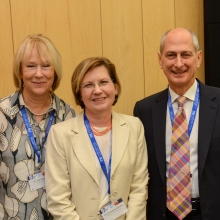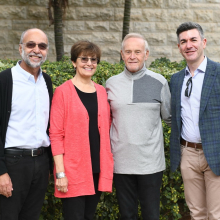The Kekst family legacy
A commitment to science, and sharing Weizmann with others
People behind the science

Carol Kekst stands in front of the new Gershon Kekst International Office.
The new Gershon Kekst International Office opened its doors in the fall to offer a bevy of essential services to visiting faculty, postdoctoral fellows, and students from overseas, responding to a dramatic rise in the number of international guests at the Weizmann Institute in recent years. The Kekst Office was inaugurated in a special ceremony at the 2018 International Board.
It is a fitting tribute to the late Gershon Kekst, the New York public relations executive and philanthropist who dedicated himself to globalizing the Weizmann Institute name and reputation until he passed away in 2017 at age 82.
The new Kekst Office is located in the former home of the late Prof. Ephraim Katzir, a renowned biophysicist at the Weizmann Institute who served as the fourth President of Israel. It will serve the growing community of international students, postdocs, and visiting scientists—making them feel at home away from home. At any given time, nearly 100 visiting faculty members are on campus, and about 800 per year. The number of international students and postdocs has more than doubled in the last 10 years. The International Office offers assistance with visas, medical insurance, arranging ulpan courses to learn Hebrew, navigating the housing market, registering children for school, and offering job search support for spouses.
Prof. Haim Harari, President Emeritus of the Weizmann Institute, and Prof. Irit Sagi, Dean of the Feinberg Graduate School, both spoke at the opening event, as did Prof. Daniel Zajfman, President of the Weizmann Institute.
All-star introduction
When Gershon Kekst walked into the Waldorf Astoria Hotel in New York in the 1970s to attend a gala event of the American Committee for the Weizmann Institute of Science—his first introduction to the Institute—he was struck by the scientists who were either faculty at Weizmann or affiliated with Weizmann, as they walked onto the dais.
“He took notice that many of the scientists were Nobel laureates and winners of other scientific prizes, and they took their seats like an all-star basketball team,” recalls his wife, Carol Kekst. “He couldn’t get over it. He talked about it all the time. He said it was like going to the Washington Monument on the Fourth of July and seeing the fireworks display. This was the start of what became a long relationship with the Weizmann Institute.”
Gershon Kekst was born and raised in Salem, Massachusetts, and founded the public relations firm Kekst & Company, a corporate and financial communications firm. His Jewish identity, and in particular the Jewish directive of repairing the world—tikkun olam—was a driving force in his life, and it became the backbone of his philanthropic activity. It led him to become a board member of Brandeis University and a Chairman of the Board of the Jewish Theological Seminary. It also led him to Weizmann.
“Gershon aimed to attract people from all over the world to lend their energies and provide the financial resources to make it possible for the scientists to accomplish their mission,” recalls Carol. “He did this by sharing worldwide the profound achievements and new discoveries of Weizmann scientists, from water and environment to agricultural production, disease control, and genetics.”
For both Carol and Gershon, philanthropy was naturally at the center of their lives. Carol Schapiro Kekst was born and raised in Baltimore by parents who were deeply involved in Jewish communal life. She lived in Jerusalem for a time, working at the Guttman Israel Institute of Applied Social Research and the Jewish Agency.
Back in New York in the 1970s, she was active in the movement to free Soviet Jewry. She received a masters degree from Columbia University’s Teachers College. She went on to serve on the boards of various Jewish schools and community foundations, and is a longtime Board member of the Jewish Museum of New York. She has been recognized for her leadership and philanthropy by JTS and Brandeis, and she followed Sara Lee Schupf as the chair of the Women in Science lecture series, a program sponsored by the New York region of the American Committee of the Weizmann Institute and held at Rockefeller University.
A PR maestro who was never in the limelight
Gershon Kekst became a co-chair of the American Committee in the 1980s, and went on to serve as Chairman of the Institute’s Board of Governors (the precursor of the International Board) from 1993-2002. He and Carol made a series of generous gifts, including one that established the Kekst Family Institute for Medical Genetics, headed by Prof. Yoram Groner of the Department of Molecular Genetics. Gershon had a brother who died of Gaucher’s disease, and he wanted to fund basic research that might help in finding a cure for genetic diseases. Then, in the 1990s, together with then-President Prof. Haim Harari, he helped the Institute strategically navigate its way back to financial security after a period of instability. Gershon saw the imperative from the point of view of the State of Israel—that a financially healthy and strong Weizmann Institute was essential to the country.
Gershon also helped broaden the Institute’s community of friends, using his professional network to open doors in other countries and publicize the research discoveries emerging from its labs.
“As a public relations leader, he felt that the Weizmann Institute was under-publicized to the world,” recalls Carol. “He felt that its breakthroughs should be shown to the world, and so as Chair of the Board of Governors he did his best to spread the word about Weizmann.”
Leading up to the turn of the millennium, he worked with Prof. Harari to launch the Jubilee Endowment Drive, with a goal of doubling the Institute’s endowment. He and Carol contributed their own funds to help reach this goal. He received a PhD honoris causa from the Institute in 1995, and the Keksts were inducted into the President’s Circle in 1999. The Institute established the Gershon Kekst Professorial Chair in his honor, whose incumbent is Prof. Sergei Yakovenko from the Department of Mathematics.
“Gershon was able to ask deep questions and then listen, and listen, and listen,” recalled President Prof. Daniel Zajfman at the International Board in 2017. “For Gershon, the connection to Israel and to the Weizmann Institute was a very important one, as was his interest in creating a bridge between the international community and the Institute. And this is why we decided to establish the new international office that will carry his name.”
Prof. Harari, who worked hand-in-hand with Kekst over many years, emotionally memorialized his late colleague and friend.
“Gershon was a great friend of the State of Israel and a great friend of the Weizmann Institute. He was also a magician: He made things happen through very hard work, but it all appeared effortless. He was a great master of public relations, but he was never in the limelight.”
In his professional work, Gershon counseled some of the world’s best-known companies, while always remaining behind the scenes. He took the same approach with Weizmann, Prof. Harari noted.
“He used to say that he was in the business of ‘sekhel’—the Hebrew word that’s a mélange of being smart, clever, wise, witty, and always one step ahead of the competition. And that was exactly what he was.”
Prof. Groner remembers how he and Gershon began their work in Prof. Harari’s presidency on the same day: Gershon as Board Chairman and he as Institute Vice President. The two became instant friends and developed a close relationship that lasted until Gershon’s death. “Gershon was a profound thinker and master of phrasing questions,” Prof. Groner recalls.
Gershon and Carol also cared deeply about transmitting their love for the Institute and the importance of philanthropy to their children—Joseph and David—and their grandchildren. Once, when asked about his family’s tradition of philanthropy, Gershon said that giving “is also a statement to your family… to the next generations. They have the benefit of knowing that this is a value—that this is a serious priority in life. I hope what I have done leaves them with an understanding of what it means in terms of their own interests and obligations.”
At the 2002 International Board meeting, Gershon used the podium to speak to his sons, saying: “Weizmann must be reenergized with young, talented, caring people … so you are charged with being full-fledged members of the Weizmann Institute family and to transmit that charge in time to your own children, m’dor l’dor—from generation to generation.”
Foreign student body on the rise
The foreign student body of the Feinberg Graduate School has grown dramatically in recent years, almost double the size of what it was five years ago. About 100 out of the approximately 700 PhD students on campus are international students, which FGS Dean Prof. Irit Sagi attributes to increased awareness of the Weizmann Institute abroad, as well as targeted efforts to attract students.
Another factor is the increased exposure of international labs to Weizmann science through the now 70-plus conferences held annually at The David Lopatie Conference Centre and other facilities.
Among them was the first-ever Joint Prague-Weizmann Winter School on Drug Discovery, convened in December. The Winter School follows four successful summer programs organized by the University of Chemistry and Technology Prague and the Institute of Organic Chemistry and Biochemistry of the Czech Academy of Sciences, attended by FGS students. This year’s Winter School drew more than 120 students and seasoned scientists from around the world, including 25 participants from the Czech Republic. The program also included lectures by representatives of pharmaceutical companies Merck, AstraZeneca, Pfizer, and Roche.
“Weizmann Institute research activities in the field of medicinal chemistry and drug discovery can benefit from such interactions, and we are looking forward to continuing this tradition of winter and summer schools,” says Prof. Sagi.
Prof. Irit Sagi is supported by Cynthia and Andrew Adelson, The Azrieli Foundation, the Leonard and Carol Berall Postdoctoral Fellowship for Research on Autoimmune Diseases Including Crohn's, the European Research Council, The Helen and Martin Kimmel Institute for Stem Cell Research, The Moross Integrated Cancer Center, the Rising Tide Foundation, John Rose, the Spencer Charitable Fund, Leesa Steinberg, and the Murray and Murielle Steinberg Crohn’s Research Fund. Prof. Sagi is the incumbent of the Maurizio Pontecorvo Professorial Chair.








